

Textmapping: Worth the Work! (Teaching Nonfiction Text Features) I'm a big fan of textmapping (check out the site www.textmapping.org) which is the brain child of a Mr.
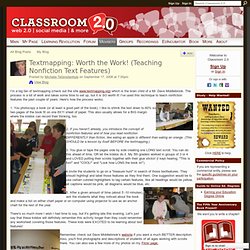
Dave Middlebrook. The process is a lot of work and takes some time to set up, but it is SO worth it! I've used this technique to teach nonfiction features the past couple of years. Here's how the process works. 1. Why is Science Important? Camping Scavenger Hunt For The Kids. We have a camping family reunion soon, and I was asked to make up a little scavenger hunt activity for all the children.
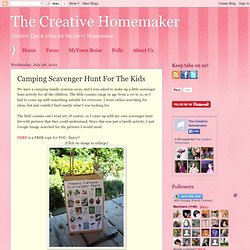
The little cousins range in age from 2 yrs to 11, so I had to come up with something suitable for everyone. I went online searching for ideas, but just couldn't find exactly what I was looking for. The little cousins can't read yet, of course; so I came up with my own scavenger hunt list with pictures that they could understand.
Since this was just a family activity, I just Google Image searched for the pictures I would need. HERE is a FREE copy for YOU. (Click on image to enlarge) Anyway, I made this picture list, printed it off, then attached it and a pen to a paper bag. *Here's a list of what's on my chart above (row-by-row from top-to-bottom): Pine Needle Green Leaf (extra points for biggest and/or smallest) Brown (dead) Leaf Plant with Root Leaf Eaten by Insect Sharp/Rough Rock Tree Bark Smooth Rock Pine Cone Acorn Wildflower (extra points if you know the name) Wild Berry ?? Coin. Physical Science Activities: Bungee Jumping with eggs! A ... Mrs. Robinson's Classroom Blog.
I am very fortunate to teach at a school in which parent involvement is high, teachers are respected and supported, and education is valued.
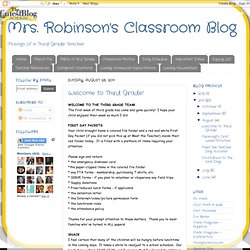
Home-school communication is one aspect of management that I pride myself on, as I make myself quite accessible to my parents. My parents, students, and myself are (usually) all on the same page, and I think that has a lot to do with the routines I establish early in the school year. Here are some of the things I do to make sure we're all "in the know": 1.
Monday Planners - On Monday mornings, I have my students fill in their weekly planner. 2. Spaghetti, Marshmallows, and COOPERATION! I facilitated a lesson with 4th graders that involved spaghetti, marshmallows, and cooperation!
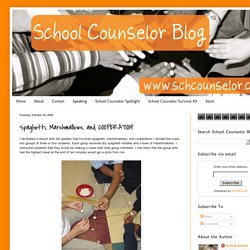
I divided the class into groups of three or four students. Each group received dry spaghetti noodles and a bowl of marshmallows. Setting Expectations for Group Work. I know...I know...you have heard me say this a million times.
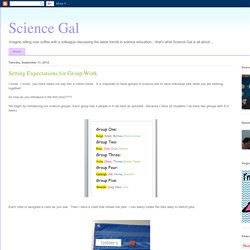
It is important to have groups in science and to have individual jobs while you are working together! So how do you introduce it the first time???? We begin by Introducing our science groups. Each group has 4 people in it (as best as possible - because I have 22 students I do have two groups with 5 in them). Each child is assigned a color as you see. We began working as groups by setting expectations. Then we worked on two simple tasks.
Why? The Times and Troubles of the Scientific Method. How simple ideas lead to scientific discoveries - Adam Savage. The Science. The Secret to Learning Anything: Albert Einstein's Advice to His 11-Year-Old Son. Science vs Scientific Method. They Might Be Giants - Put It to the Test - Official video. Be a geek and a nerd: Jim Kakalios at Convocation 2009. Grouping Cards.pdf. Teacher Lab and Reading Notebooks. In my district, we were fortunate to have a full time Reading Coach that helped K-5 teachers fully implement Reading Workshop this past year.
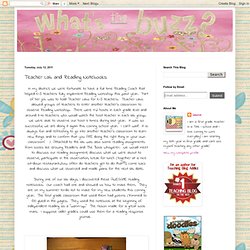
Part of her job was to hold Teacher Labs for K-5 teachers. Teacher Labs allowed groups of teachers to enter another teacher's classroom to observe Reading Workshop. There were 1-2 hosts in each grade level and around 8-10 teachers who would watch the host teacher in each lab group. We were able to observe our host 3 times during last year. It was so successful, we are doing it again this coming school year. During one of our lab days, I discovered these AWESOME reading notebooks. What do you use for reading notebooks? expedioscientiam.net/school/resources/what_not_to_do_600.pdf.